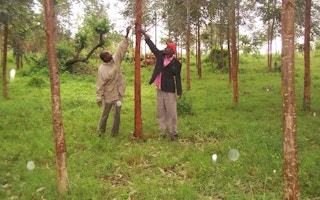A new Australian bank claims to be the world’s first combination of crowd funding and banking.
“Act” is a division of Community Sector Banking, which is a joint venture between Bendigo Bank and Community 21, a banking service for the not-for-profit sector.
The initiative was, its creators say, the “logical evolution” from CSB’s heavy focus on the not-for-profit sector.
Act provides the same products most people use such as savings accounts, credit cards and home loans.
The difference is in what the bank does with the profits it makes with these products.
For example, for a $250,000 home loan, the customer will be given $31.16 “impact dollars” a month to give to a community project of their choice listed on the Act website.
The projects are run by community groups or charities trying to raise money for something very specific, such as a new dishwasher for a women’s service in Kings Cross or meals for single parents in outer suburban Melbourne.
Each project has a time limit of 60 days to get funded and if not enough money is pledged, the money is directed back to the customer to be put towards a different project.
Act calls its customers “activists”.
Head of Act digital Alexander Scriven said the initiative was different to the traditional way of crowd funding – people using money from their own pocket.
“We simply share a portion we make off each product back with you,” Mr Scriven said.
“A lot of people can’t believe it; why would you share your profit?
“Our view is, if we truly represent communities being more robust, then why not?
“Banks are there to make money, yes, and we also make money, but we like to think we make profit for a purpose.”
Mr Scriven said the bank’s returns were not always represented on a balance sheet, but tangibly in the difference made to people’s lives.
At the moment Act has a core team of 10 people, with more support staff in CSB across the nation.
There are no branches – everything is done over the phone and online.
Mr Scriven said Act was growing despite the fact it hadn’t yet launched a marketing strategy.
So far he said it had survived mostly by word of mouth, but the real push would happen soon.
“Hopefully the stream will turn into an ocean,” he said.
Mr Scriven said Act was particularly interested in supporting green projects.
“If you imagine a community with 100 people each with a $250,000 home loan [which gives them each $30 to give away], at $3000 a month, that can be an income stream that buys solar panels every month,” he said.
Particularly in the current political climate where the federal government is providing little funding for climate-related projects, Mr Scriven said the corporate community had the opportunity to “step up and create real impact”.
Many are concerned about the projects their bank supports.
The Act initiative is timely in light of an Essential Research poll released this week that found that 82 per cent of Australians think banks should consider the social and environmental impacts of projects they fund.
The poll found that 63 per cent of Australians disapproved of their bank helping finance coal port expansions on the Great Barrier Reef.
Change.org Australia campaigns director Charlie Wood said it was no surprise that Australians were joining the dots between their money and social and environmental threats.
“These results are a clear indication that the more people learn about fossil fuel expansion on the Reef, the more they don’t like it,” Mr Wood said.
“The fact that our banks are considering financing these expansion plans is truly alarming, but they should be forewarned that their customers are starting to think twice before putting their own money with banks associated with these projects.”










